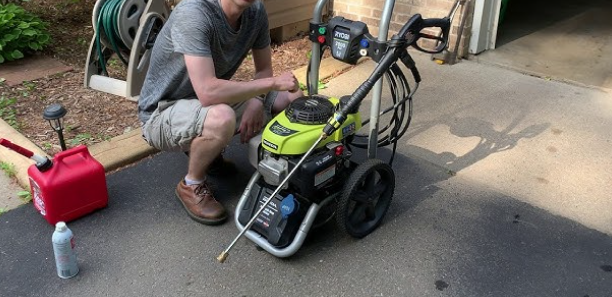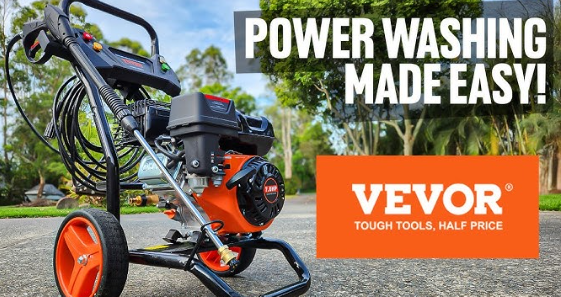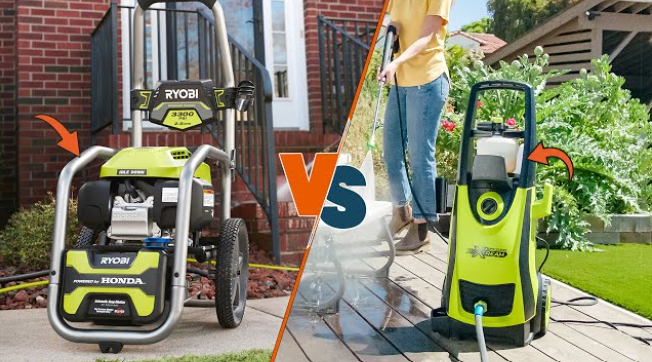Is Ryobi Better Than Vevor Pressure Washer?
A good pressure washer makes cleaning outdoor surfaces faster, easier, and far more satisfying. Whether it’s washing your car, blasting grime off the driveway, or cleaning your deck, the right tool saves both time and effort. Among popular brands, Ryobi and Vevor often come up in conversation.
Ryobi is known for its reliable power tools and home equipment. Vevor, on the other hand, attracts attention for its low prices and wide range of products. Both have fans, but many users still ask: Is Ryobi better than Vevor pressure washer?
The answer depends on what you value more — long-term reliability or a lower upfront cost. This guide compares both brands in depth, covering performance, quality, price, and everyday use. Let’s break it down step by step.
About Ryobi Pressure Washers

Ryobi is a trusted name in home improvement and outdoor tools. The company is known for its electric and gas-powered washers that balance price and quality. Ryobi washers are sold through major hardware stores and backed by strong customer support.
They’re ideal for regular homeowners who need reliable cleaning power for cars, patios, siding, and driveways. The brand focuses on consistent water pressure, ease of use, and long-term performance.
Main Features of Ryobi Pressure Washers
-
Pressure Range: Around 1,600–3,000 PSI
-
Flow Rate: 1.2–2.3 GPM depending on model
-
Power Options: Electric or gas-powered
-
Design: Strong frame with large wheels and durable hose
-
Extras: Turbo nozzle, soap applicator, and onboard storage
Most Ryobi pressure washers also feature quick-connect fittings, making setup easy even for beginners. They work smoothly for both light and heavy cleaning tasks.
About Vevor Pressure Washers

Vevor is a newer and budget-focused brand. The company sells a wide range of products, from tools to industrial equipment. Their pressure washers are designed to be affordable while still offering decent power.
Vevor machines often have high PSI ratings on paper, which look attractive to first-time buyers. They are mainly built for light to medium-duty cleaning jobs around the home.
Main Features of Vevor Pressure Washers
-
Pressure Range: 2,000–3,800 PSI (advertised)
-
Flow Rate: Around 1.6–2.8 GPM
-
Power Source: Electric motor
-
Body Design: Compact and lightweight plastic housing
-
Accessories: Foam cannon, spray gun, multiple nozzle tips
The lightweight design makes Vevor washers easy to carry and store, but long-term users sometimes report reduced performance after heavy use.
Comparison: Ryobi vs. Vevor Pressure Washer

Here’s a closer look at both brands under several key areas.
1. Power and Performance
Ryobi delivers consistent power output. Its electric washers offer real-world pressure close to what’s advertised. The motors are strong enough to remove dirt, oil stains, and mildew from different surfaces.
Vevor pressure washers claim higher PSI ratings, but many users find the real pressure lower than listed. The motors sometimes struggle with tougher cleaning jobs like concrete or large patios.
Verdict: Ryobi produces more reliable and steady pressure for long-term cleaning tasks.
2. Build Quality and Durability
Ryobi washers use a strong metal frame and quality plastic for external parts. They feel sturdy, and their hoses and nozzles last longer. Even the smaller models hold up well under frequent use.
Vevor washers, while affordable, use lighter materials. The housing feels thinner, and connectors can loosen with time. They work fine for light jobs but might not handle constant heavy cleaning.
Verdict: Ryobi wins for durability and material quality.
3. Ease of Use
Ryobi pressure washers are known for user-friendly design. Large wheels, organized hose storage, and a simple interface make them easy to handle. Even beginners can get them running in minutes.
Vevor models are lightweight and portable, which makes setup easy too. But hose fittings can sometimes leak, and the spray gun trigger may feel stiff.
Verdict: Both are easy to operate, but Ryobi offers smoother performance overall.
4. Noise Level
Electric Ryobi washers are fairly quiet, ideal for home neighborhoods. The gas-powered ones make more noise but still stay within reasonable limits.
Vevor washers are also quiet at first, though their motor sound may increase with extended use.
Verdict: Ryobi sounds smoother and more balanced during long cleaning sessions.
5. Price and Affordability
Vevor wins in price. It’s a clear choice for buyers on a tight budget. The brand offers more power on paper for less money.
Ryobi is more expensive but provides better long-term value. You get consistent performance, stronger build, and reliable parts.
Verdict: Vevor is cheaper; Ryobi is worth the extra cost for quality and reliability.
6. Maintenance and Spare Parts
Ryobi offers better after-sales service and easy access to replacement parts. You can find hoses, nozzles, or attachments in most local hardware stores.
Vevor parts are not always easy to find. Most replacements require online orders, and customer response may take time.
Verdict: Ryobi offers stronger maintenance and repair support.
7. Safety Features
Ryobi includes several safety measures such as automatic shut-off, trigger locks, and thermal protection. These protect both the user and the motor.
Vevor usually has a basic trigger lock but fewer advanced safety systems.
Verdict: Ryobi provides safer operation and longer motor protection.
8. Design and Portability
Ryobi washers have a balanced frame with large wheels and sturdy handles. This design makes it easy to roll across yards or driveways.
Vevor washers are lighter, which makes them easy to carry but easier to tip over during use.
Verdict: Ryobi feels more stable; Vevor wins in lightness.
Performance on Different Surfaces
Let’s see how both perform on common cleaning tasks.
Car Cleaning
Ryobi provides steady water flow without harming paint. The included soap nozzle helps apply detergent evenly.
Vevor cleans cars quickly but may feel too strong if used too close to the surface.
Driveways and Concrete
Ryobi electric models clean light stains easily. The gas versions are powerful enough for deep cleaning.
Vevor can clean small driveways but may take longer to remove oil spots or mildew.
Decks and Patios
Ryobi’s adjustable nozzles make it easy to switch between gentle and strong cleaning.
Vevor does the job, but hose flexibility and nozzle quality can limit control.
Which One Lasts Longer?
Longevity depends on build quality, maintenance, and usage.
Ryobi washers typically last many years with basic care. The motors and hoses are built to handle frequent use.
Vevor washers last shorter, especially under heavy load. They’re better for occasional weekend cleaning.
Verdict: Ryobi lasts longer and holds up under tougher conditions.
Best Uses for Each Brand
Ryobi Pressure Washer
-
Suitable for driveways, vehicles, decks, and patios
-
Great for frequent or long cleaning sessions
-
Ideal for homeowners who need reliability
Vevor Pressure Washer
-
Perfect for small household jobs
-
Works best for lightweight cleaning tasks
-
Good for users on a budget or first-time buyers
Real User Experience
Many users who own both brands agree that Ryobi feels stronger and more stable. It starts easily, runs smoothly, and rarely loses pressure. Users also like the wide service network.
Vevor users appreciate the low price and accessories like foam cannons but sometimes mention hose leaks, broken nozzles, or weak pressure after long use.
Common Feedback Summary:
-
Ryobi: Reliable, sturdy, long-lasting.
-
Vevor: Affordable, light, but less durable.
Expert Opinion
Experts in home tools often recommend Ryobi for consistent performance and better build. They point out that the motor and internal seals are designed to handle high pressure without early wear.
Vevor gets credit for offering value but is considered a better fit for occasional use, not heavy-duty cleaning.
Pros and Cons Table
| Feature | Ryobi | Vevor |
|---|---|---|
| Power Output | Consistent and real | Often overrated |
| Durability | Strong and long-lasting | Light build, less sturdy |
| Ease of Use | Smooth and simple | Simple but can leak |
| Price | Higher | Lower |
| Noise | Moderate | Quiet at first, louder over time |
| Maintenance | Easy with local parts | Harder to find replacements |
| Safety | Better protection features | Basic trigger lock only |
| Longevity | Several years | Shorter lifespan |
Which One Should You Choose?
The choice depends on your needs.
If you want a tool for long-term use with dependable performance, Ryobi is the clear winner. It’s reliable, powerful, and easy to service.
If you need something cheaper for occasional cleaning, Vevor can work fine. It’s light, portable, and easy to store. But don’t expect it to last as long or handle constant heavy jobs.
My Opinion
Ryobi offers better quality, stronger pressure, and more reliable results. It’s the kind of washer that you can use for years with minimal trouble. The performance stays consistent even after months of use.
Vevor has one advantage — price. It’s affordable, and for light work, it gets the job done. But for bigger cleaning tasks like driveways or decks, it often struggles to keep up.
So, yes, Ryobi is better than Vevor pressure washer for anyone who wants long-lasting, dependable power and less hassle.
FAQs
1. Is Ryobi more powerful than Vevor?
Yes, Ryobi delivers more consistent pressure that matches its ratings.
2. Does Vevor have good build quality?
Vevor works fine for light use, but materials are lighter and less durable.
3. Which pressure washer lasts longer?
Ryobi, because of its strong frame, better seals, and reliable motor.
4. Can Vevor washers clean driveways?
Yes, but they may take longer or need multiple passes for heavy dirt.
5. Are Ryobi parts easy to find?
Yes, parts are available in most hardware stores and online.
6. Which brand is safer to use?
Ryobi includes more safety features like automatic shut-off and thermal protection.
7. Is Vevor worth the low price?
Yes, if you only need a pressure washer for small or occasional cleaning jobs.
8. Do both brands make electric models?
Yes, both brands sell electric versions suitable for home cleaning.
9. Which washer is quieter?
Both are quiet, but Ryobi motors sound smoother during use.
10. Which one is better overall?
Ryobi is better overall for long-term, heavy, and reliable cleaning performance.
Conclusion
Ryobi and Vevor both offer good pressure washers, but they serve different users. Ryobi is for those who want lasting quality, solid pressure, and easy service. It’s dependable and performs well on all surfaces — cars, decks, patios, and concrete.
Vevor is best for users who want an affordable option for simple cleaning jobs. It’s light, portable, and easy to store, but it can’t match Ryobi’s strength or durability.
So, is Ryobi better than Vevor pressure washer?
Yes. Ryobi wins for power, quality, and long-term reliability. It’s the smarter choice for anyone who values performance and wants a washer that keeps working year after year.







